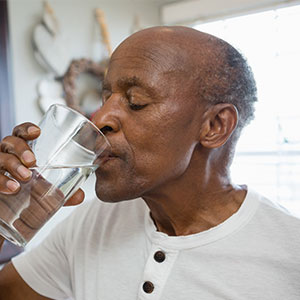Drink Up: The Importance of Staying Hydrated for Seniors

Staying hydrated is important at every age, but as you get older, your body composition changes and the amount of water in your body decreases. This means that it takes less water loss to become dehydrated and experience impacts to your health. In addition, the sensation of thirst also decreases with aging, so you feel less thirsty throughout the day, even when your body needs more fluids.
What Causes Dehydration?
While not drinking enough fluids is a major cause of dehydration, there are many other factors that can contribute as well, such as:
- Illness – you can become dehydrated due to vomiting, diarrhea, or fever.
- Sweating – when your body perspires, it loses water.
- Urination – frequent urination can cause your body to become dehydrated if you are not drinking enough to replace the water loss.
Certain diseases, conditions, or medications can affect your ability to stay hydrated. Seniors with dementia may not remember to keep drinking throughout the day, and those with uncontrolled diabetes or who are on diuretics may urinate more frequently.
What are Symptoms of Dehydration?
One of the first signs of dehydration is feeling thirsty, but as previously mentioned, as you get older you may not feel as thirsty, even if you are. You may end up feeling excessively thirsty and unable to quench your thirst, and this can be a sign of moderate to severe dehydration.
Other symptoms include:
- Dry or sticky mouth
- Dark-colored urine
- Dizziness or light-headedness
- Confusion or disorientation
- Trouble keeping fluids down – vomiting/diarrhea
- Unusually sleepy
How Can You Prevent Dehydration?
Fortunately, there are many ways you can increase your water intake and help prevent your body from becoming dehydrated.
Drink more water. Set a timer to remind yourself to take a drink of water every 30 minutes or so. Keep a glass or bottle of water with you so it is easily accessible and seeing it reminds you to keep drinking. If you don’t like the flavor of plain water, spruce it up with some fresh fruits, vegetables, or herbs. Don’t forget that coffee, tea, juice, and smoothies also count, just be aware of the amount of sugar or calories in them.
Eat more fresh produce. There are a lot of fruits and vegetables with high water content such as watermelon, strawberries, peaches, cantaloupe, oranges, cucumbers, lettuce, zucchini, tomatoes, and celery. Eating these foods as a snack or part of your meal can naturally help you increase your water consumption.
Sip on soups or broths. There are tons of hot and cold soups that you can incorporate into your diet to help you get more nutrients and increase your fluid intake. Many soups freeze well, so you can keep some on hand in the freezer for a quick meal. Don’t overlook the benefits of yogurt or cottage cheese as well, as they have high water content.
How Senior Care Can Help
In-home caregivers can be a wonderful resource for helping seniors to reduce their risk of becoming dehydrated. Not only can a caregiver make sure fresh water is easily accessible, but they can also provide regular reminders to keep drinking throughout the day. In addition, in-home care providers can assist with meal planning and preparation so that there are foods with high water content readily available for meals and snacks. They can also pay attention for signs of potential dehydration and encourage more water intake or seek medical care.
Contact Always Best Care at (855) 470-2273 to schedule a free consultation and learn more about the vast benefits of non-medical in-home care for seniors.





